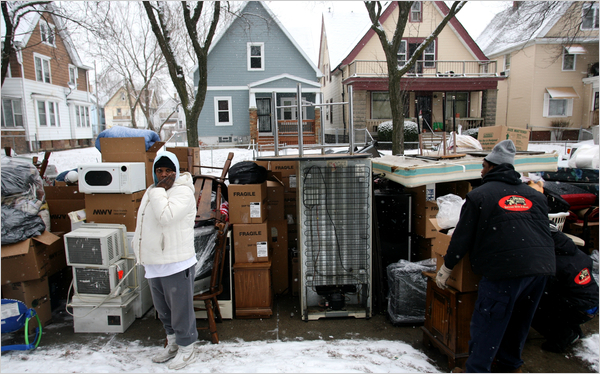Tuesday
I thought of a Lucille Clifton poem the other day after reading a very dispiriting Slate article about evictions. Apparently America right now is going through an eviction epidemic, even as the economy slowly improves. According to Harvard sociologist Matthew Desmond,
we are evicting hundreds of thousands of people, probably in the millions, every year. There’s this divergence between what low-income families are making and what they have to pay to keep a roof over their heads and heat in their house. Between 1995 and today, median rent increased by over 70 percent. In the 2000s the cost of fuel jumped by 53 percent.
Desmond, whose book Evicted: Poverty and Profit in the American City has just been released, says that the consequences of an eviction ripple outward:
The consequences of eviction are so much greater than I was fully aware of when I started the work. Families not only lose their homes. Kids lose their schools. They also lose their things, which are piled on the sidewalk. It’s a lot of time and money to establish a home, and eviction erases all that. It comes with a record, which affects your chances of moving into stable housing because a lot of landlords will turn you away. Even in public housing an eviction record is counted as a strike.
So we see families move from poor neighborhoods to poorer ones and neighborhoods with high violence rates to even more dangerous neighborhoods. When I started I thought that job loss would lead to an eviction, but we found better evidence of the opposite. Then there’s the effect eviction has on your mental health. There are higher rates of depression even two years later, and we know that suicides attributed to eviction have doubled [between 2005 and 2010].
“the 1st” owes its title to the fact that the rent comes due on the first of the month–and when you can’t pay it, you’re out. Its power lies in the contrast between the carefree neighborhood children and the “emptied family.” The poet doesn’t need to say anything more.
On the one hand, there are all the images of rising: stacked boxes, “couch springs curling through the air,” drawers and tables on a curb tightrope, children “leaping up and around.” On the other, there are the empty feelings, mirroring the empty rooms, of a family whose life has just been upended.
In that regard, the poem resembles W. H. Auden’s “Musée des Beaux Arts”: even as Icarus is dying and people are suffering, there are children “skating on a pond at the edge of the wood.”
Here’s the poem:
the 1st
By Lucille Clifton
what i remember about that day
is boxes stacked across the walk
and couch springs curling through the air
and drawers and tables balanced on the curb
and us, hollering,
leaping up and around
happy to have a playground;
nothing about the emptied rooms
nothing about the emptied family
Desmond, by the way, has a solution: a universal housing voucher for low income renters—which is to say, an expansion of the Section 8 program:
Do we believe housing is a right and that affordable housing is part of what it should mean to be an American? I say yes. Then the question becomes how do we deliver on that obligation? I think taking this program that works pretty darn well and expanding it to all families below the poverty line is the best way to do that. These families spending 80 percent of income on rent would be paying 30 percent. They’d be saving and spending money on their kids. We know from previous research that when families get a housing voucher after years on the waiting list, they buy more food, they go to the grocery store, and their kids become stronger. The book goes into how much that would cost and how to do that. But first we have to recognize how essential housing is to driving down poverty and recognize that we can’t fix poverty without fixing housing.


